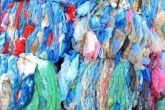WasteAid receives funding to support circular economy in South Africa
WasteAid has been awarded funding through The International Circular Plastic Flagship Projects Competition to support a feasibility study on developing a circular economy in Mpumalanga, South Africa.

The competition, facilitated by the Waste Resources Action Programme (WRAP) and UK Research and Innovation (UKRI), awarded £1.2 million in grant funding to six organisations developing innovative solutions to plastic packaging waste challenges.
With expert partners at the University of Portsmouth and the local Department of Agriculture, Rural Development, Land, and Environmental Affairs (DARDLEA), the project aims to strengthen waste collection and recycling processes in the Province.
The project will address three challenges surrounding plastic pollution: reducing littering of flexible packets, identifying gaps in knowledge and operational resources in collections, and stimulating end-markets for recyclable materials.
Currently, littering is a major problem in Mpumalanga, where it not only threatens the environment, but also public health. Due to a lack of options for disposing of materials, a lot of waste ends up entering waterways and harming marine life. A lack of infrastructure also leads to a large amount of litter being burnt, posing a risk to both the environment and local lung health.
With the University of Portsmouth, WasteAid will be trialling participatory approaches to improve waste segregation in households. This would also raise awareness of the issues caused by littered flexible plastics and encourage people to recycle more widely.
When representatives from the two bodies visited the region, they were able to identify key points of intervention, as well as creatives with whom they could work with to design behaviour change campaigns.
Alongside DARDLEA, the charity will be supporting the increase of collection and processing of segregated waste. With the aim of promoting circularity and strengthening the waste value chain, the partnership will work with local processors to increase their capacity, which will in turn see more recovered materials staying in the local economy.
WasteAid’s Circular Economy Network Director, Michelle Wilson, commented: “We are honoured to be one of the projects selected to be part of the Plastics Challenge Competition and look forward to working with the University of Portsmouth and the local Municipality in South Africa to test methods that will improve the recovery rates of recycled plastic as well as closing the loop on materials locally”







